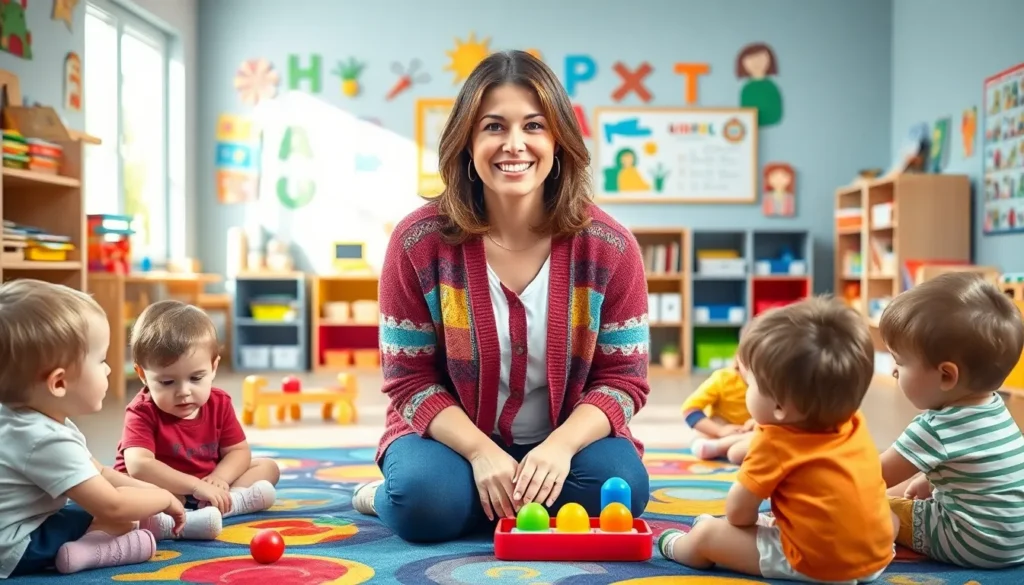Table of Contents
ToggleIn a world where the future hinges on the creativity and curiosity of young minds, pursuing a master’s in early childhood education isn’t just a degree; it’s a superpower. Imagine wielding the ability to shape the next generation while enjoying snack time and story hour. Yes, that’s right! With a master’s, educators don’t just teach—they inspire, innovate, and maybe even sneak in a few dance breaks along the way.
Investing in a master’s in early childhood education opens doors to a fulfilling career filled with laughter and learning. It’s a chance to create environments where children thrive, explore, and discover the joy of knowledge. So, if you’re ready to trade in your coffee breaks for playtime and your spreadsheets for storybooks, this journey might just be the perfect fit.
Overview Of Masters Early Childhood Education
A master’s in early childhood education offers advanced knowledge and skills essential for working with young children. Programs typically cover child development, curriculum planning, and assessment methods. Educators deepen their understanding of the emotional, social, and cognitive growth of children from birth to age eight.
Courses focus on effective teaching strategies tailored to different learning styles. These strategies include hands-on activities, collaborative projects, and technology integration. Graduates cultivate an ability to create engaging learning environments that inspire curiosity and creativity in children.
Field experiences play a crucial role in preparing educators for real-world settings. Internships and practicums enable students to apply theoretical knowledge in classrooms, fostering practical skills. Networking opportunities often arise through collaboration with experienced professionals in early childhood education.
The degree may also open doors to leadership roles within educational institutions. Educational administrators and policy makers seek individuals who possess advanced expertise in childhood education. Opportunities for advocacy in early childhood policies further contribute to the impact educators have on community development.
Programs may vary in structure, with some offering online options for flexibility. Many institutions allow students to specialize in areas such as special education or curriculum design. Pursuing a master’s degree represents a commitment to professional growth and lifelong learning.
By acquiring a master’s degree in early childhood education, individuals enhance their career prospects while contributing positively to child development and early learning experiences. A fulfilling journey awaits those who embark on this educational path.
Benefits Of Pursuing A Masters In Early Childhood Education


Pursuing a master’s in early childhood education presents numerous advantages. This path not only enriches educators’ careers but also fosters significant changes in the educational landscape.
Career Advancement Opportunities
Career advancement becomes more accessible with a master’s degree in early childhood education. Advanced qualifications often lead to higher salaries—on average, educators with a master’s degree earn 10 to 20 percent more than those with only a bachelor’s degree. Leadership roles, such as program directors or education coordinators, frequently require advanced degrees. Professional growth in the field also opens opportunities in policy-making and advocacy, enabling educators to influence early childhood education standards and practices. Networking with professionals through coursework and internships enhances connections in the field, further advancing career prospects.
Enhancing Teaching Skills
Teaching skills improve significantly through a master’s program in early childhood education. Coursework covers topics like child development, effective pedagogies, and curriculum design. Innovative teaching strategies emerge as graduates learn to adapt their methods to various learning styles and cultural backgrounds. Real-world experiences during practicums allow for practical application of theoretical knowledge, refining classroom management and communication skills. Educators who pursue this degree become more equipped to create engaging, developmentally appropriate learning environments that foster children’s curiosity and creativity.
Curriculum Of Masters Early Childhood Education Programs
Masters programs in early childhood education typically focus on essential topics related to child development and effective teaching practices. These curricula aim to equip educators with the skills necessary to create engaging learning environments for young children.
Core Courses
Core courses cover foundational subjects such as child psychology, curriculum design, and assessment strategies. Students explore theories of developmental milestones and the importance of play in learning. Practicum experiences offer valuable hands-on opportunities, allowing students to apply classroom knowledge in real-world settings. Special attention is given to inclusive education practices that address diverse learning needs. Additionally, coursework often includes discussions on current educational policies impacting early childhood education.
Specialization Options
Specialization options allow students to tailor their studies based on individual interests. Popular areas include special education, curriculum development, and urban education. Candidates might choose to focus on bilingual education to support multilingual learners or on leadership in early childhood settings for aspiring administrators. Programs often offer the flexibility to pursue certifications in specific methodologies like Montessori or Reggio Emilia. Engaging with these specializations enriches the educational experience and enhances career prospects in various fields within early childhood education.
Admission Requirements For Masters Programs
Admission requirements for master’s programs in early childhood education vary by institution but generally include certain criteria. Candidates typically need a bachelor’s degree from an accredited program, often in education or a related field. Some schools accept applicants with degrees in other areas if they demonstrate strong interest in early childhood education.
Educational Background
A relevant educational background remains essential. Many programs prefer candidates who have completed coursework in child development or educational psychology. Some institutions may require a minimum GPA; generally, a 3.0 is standard for consideration. Applicants with teaching experience or prior certifications in early childhood education often stand out during the selection process.
Application Process
The application process typically involves submitting several key components. Interested candidates usually need to provide a completed application form along with official transcripts. Most programs also request letters of recommendation, typically from academic or professional contacts. A personal statement outlining career goals, relevant experiences, and motivations for pursuing a master’s in early childhood education often plays a critical role in the evaluation. Some institutions may even require standardized test scores, such as the GRE, though many have shifted towards test-optional policies.







